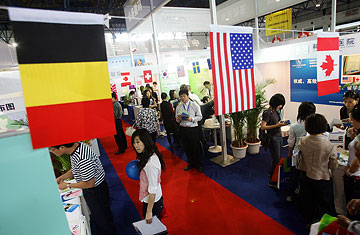
Chinese students and their parents attend the International Education Expo in Beijing on May 8, 2008
It happens every summer. In the weeks after the annual National College Entrance Examination, new high school graduates wait for the list. For years, who gets into China's most prestigious universities has been a matter of public interest, as Chinese reporters publish a roll call of the highest-scoring high school graduates from each province. And for years, that list of the nation's top 100 and 200 students has determined which one of the country's top universities — Peking or Tsinghua — lands most of them.
Now, however, something has changed. Big-name foreign universities are complicating the two-way rivalry — a trend that has both China's education experts and the general public worrying about the competitiveness of higher education in China. While 9.3 million Chinese students took the college-entrance exam in 2011, close to 1 million high school graduates did not, and among them, some 200,000 chose to go to foreign universities instead. Today over 100,000 Chinese high school graduates attend college in the U.S. each fall, and this year at least 17 of the top 100 mainland students chose to go to the University of Hong Kong.
The exodus of the country's brightest high school students has renewed discussions in the media about the ongoing problem of higher-education reform. And so far — in the absence of any clear evidence that reform is actually happening — public opinion of China's universities has become more and more skeptical, if not downright negative.
A recent disclosure of the total debt racked up by China's universities last year — a record $40.69 billion — has not helped their cause. Although experts largely attribute the debt to the expansion of campuses as a result of surging demands for higher education, the news quickly spread online, triggering more questions and calls for change. "Without [higher education] reform, there will be no improving in the quality of education to begin with, because all universities are essentially the same institutions under the same guidelines," says Xiong Bingqi, vice president of the 21st Century Education Research Institute, a nongovernmental organization focused on China's education reform. "We are seeing more students voting with their feet now, and the government is definitely feeling the pressure."
Beijing knows something has to be done. In the official 10-year blueprint for education reform issued by the State Council last July, policies like "expanding the universities' administrative authority" were listed — albeit vaguely — among its 70 bullet points. If implemented, such policies would be the first step toward freeing universities from governmental control, a drastic turn from the status quo. "The truth is, no one has come up with a plan toward realizing such goals yet," says Xiong. "And without a concrete plan, local governments are certainly not incentivized to give their power up."
So far, attempts to change the system from within have not yielded much. Earlier this year, the South University of Science and Technology of China (SUSTC), a much anticipated experimental university that has prided itself on its groundbreaking principles of management, was ordered by the Ministry of Education that all students admitted must take the standardized national admittance exam, a requirement the SUSTC was trying to abolish. The school's leadership was further lambasted by three professors from the Hong Kong University of Science and Technology for putting reform for reform's sake before education and "driving the university away from its original goal to becoming a top research-oriented university."
Even if a education reform does win government backing, making those improvements would be confronted with a different obstacle: money. "On the one hand, the schools need more administrative power in terms of admissions and recruiting," says Yu Lizhong, president of East China Normal University. "On the other, to be able to hire a better teaching staff requires a lot more money than what the government is providing now." Yu, whose university is home to New York University's newly established Shanghai campus, speaks admiringly of a recent NYU fundraising event he participated in, adding that Chinese universities, predominantly funded by the government, have a lot of catching up to do.
In the long run, however, changing how the public values higher education might present the bigger challenge. For many, education is equated with survival in the government-devised system — a pragmatic means to an end: a stable job. "Although there's a lack of confidence in the current education system, people still recognize an accredited diploma much more than the education itself," says Xiong. "And that needs to be changed."
